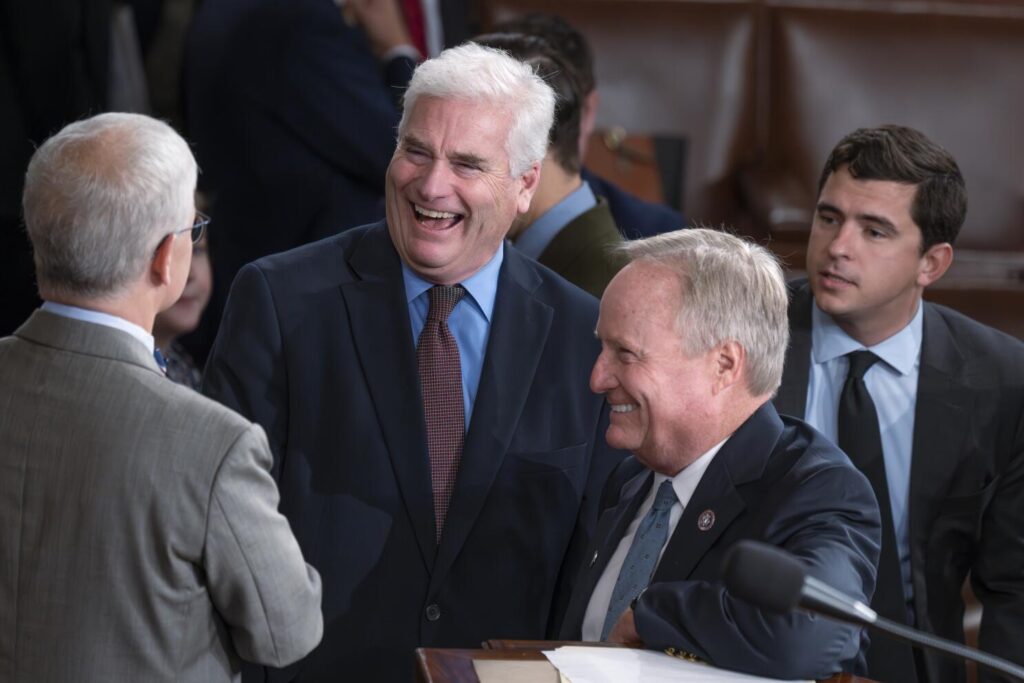
FILE—House Majority Whip Tom Emmer, R-Minn., center, is flanked by Rep. Patrick McHenry, R-N.C., the temporary leader of the House of Representatives, left, and Rep. David Joyce, R-Ohio, right, as lawmakers convene to hold a third ballot to elect a speaker of the House, at the Capitol in Washington, Friday, Oct. 20, 2023. After the rejection of former speaker Kevin McCarthy, Majority Leader Steve Scalise and Judiciary Committee Chair Jim Jordan by the GOP caucus, Emmer is emerging as the newest probable candidate to hold the gavel. (AP Photo/J. Scott Applewhite, File)
Day 20 without a House speaker, and Republicans found themselves starting over on Monday — bumbling ahead with few ideas about who will lead, what they are fighting over and when they will get Congress working again.
Nine lower-level Republican lawmakers are now running to be speaker, leader of the House and second in line to the presidency — none with any clear shot for the gavel. Senior-most is Rep. Tom Emmer of Minnesota, the former campaign chief who is now the GOP whip. But the gruff former hockey coach is disliked by Donald Trump, potentially dooming his candidacy.
Late Monday, House Republicans are retreating behind closed doors, as they have most days since the ouster of Kevin McCarthy, to hear from the candidates ahead of internal party voting.
What started as swaggering bravado when a contingent of hardline Republicans led by Rep, Matt Gaetz of Florida ousted McCarthy at the start of the month has morphed into a full-blown crisis of governing as dysfunction and dangerous, bitter infighting prevent the normal operations of Congress.
Yet factional power plays are running stronger on Capitol Hill than any sense of urgency to resolve the standoff as the House Republicans are essentially eating their own — first by ousting McCarthy just nine months on the job, then rejecting the next nominees to take his place, Majority Leader Steve Scalise and hard-edged Judiciary Committee Chairman Jim Jordan.
What had started as far-ight complaints over McCarthy’s leadership in budget battles is now a string of political and personal grievances over various leaders, factions and personalities.
“Is there anybody that can get there? I don’t think there is,” said Rep. Troy Nehls, R-Texas, who has repeatedly suggested Trump should be elected House speaker.
Trump himself has largely stayed in the background, but his presence is everywhere. The former president who is now the Republican frontrunner to challenge Biden in 2024, helped sink Scalise’s nomination by backing Jordan instead.
But when more centrist GOP conservatives in the House refused to back Jordan, worried about elevating a far-right Freedom Caucus founder as speaker, Trump was unable to salvage the Ohioan’s nomination. The House Republicans dropped Jordan as their nominee late Friday.
The House has never been here before, having ousted its own speaker for the first time in history, and now led by a nominal interim speaker pro tempore Rep. Patrick McHenry, R-N.C., the bow-tie wearing chairman of the Financial Services Committee whose main job is now to elect a more permanent speaker.
Some Republicans — and Democrats — would like to simply give McHenry more power to reconvene the House and get on with the routine business of governing. But McHenry, the first person to be in the position that was created in the aftermath of the Sept. 11, 2001, terror attacks as an emergency measure, has brushed back those overtures.
In the Senate, Republican leader Mitch McConnell who is trying to helm the party through a tumultuous time, has had little advice for his colleagues on the other side of the Capitol.
“Look, I’m not an expert on the House. I have my hands full here in the Senate,” McConnell said Sunday on CBS. “We’re gonna do our job and hope the House can get functional here sometime soon.”
For now, Emmer and the others will try their hand at uniting the broken Republican majority around each of their candidacies. Among those running are potential leaders, to be sure, but no singular figure who stands out as an obvious choice.
Along with Emmer, the rough-talking former hockey coach, is another member of leadership, Rep. Mike Johnson, an affable lawyer from Louisiana, and Rep. Kevin Hern, a former McDonald’s restaurant franchise owner who now leads the conservative Republican Study Committee, the largest bloc of House conservatives.
Also running are Rep. Byron Donalds, a Florida newcomer aligned with Trump; Austin Scott of Georgia, who had briefly challenged Jordan with a protest bid, and Pete Sessions, a former party leader from Texas.
Others include Rep. Jack Bergman of Michigan, Dan Meuser of Pennsylvania and Gary Palmer of Alabama.
Rep. Dusty Johnson of South Dakota, who leads a group of mainstream conservatives, said he was looking for a speaker candidate who would be willing to put his own political career on the line to move House Republicans forward.
“Whoever navigates us through these difficult waters, which will be shrapnel filled, they may need to give up their own political career for the good of this country,” he said.
__ Associated Press writers Stephen Groves, Farnoush Amiri and Kevin Freking contributed to this report.







